Our Work
Founded in 2014, the Center on Privacy & Technology is a leader at the intersection of privacy, surveillance, and civil rights.
Latest Work
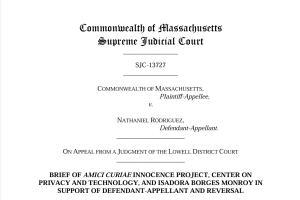
Privacy Center filed an amicus brief with the Harvard Cyberlaw Clinic
The Center on Privacy & Technology filed an amicus brief with the Harvard Cyberlaw Clinic in Commonwealth v. Rodriguez (SJC-13727). The brief supports the defendant-appellee’s objection to the use of racially-targeted police investigatory techniques on social media platforms.
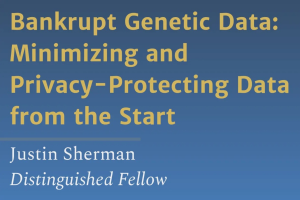
“Bankrupt Genetic Data: Minimizing and Privacy-Protecting Data from the Start” blog
After 23andMe filed for bankruptcy, a judge granted the genetic testing company permission to sell its data on more than 15 million customers. Distinguished Fellow Justin Sherman wrote a blog post on our site detailing what steps companies and policymakers can and should do to mitigate the risks from potential bankruptcy-data fallouts. Read the whole bl0g here.
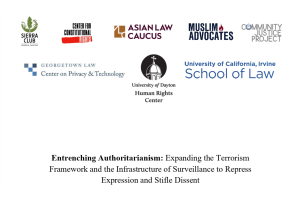
Privacy Center jointly submitted report to the UN Human Rights Council
The Center on Privacy & Technology at Georgetown Law and seven other organizations jointly submitted a report to the UN Human Rights Council, “Entrenching Authoritarianism: Expanding the Terrorism Framework and the Infrastructure of Surveillance to Repress Expression and Stifle Dissent.” The report shows the surveillance system available to the Trump administration and its use to repress freedom of expression. Truthout covered the release in this piece, “Rights Groups Detail “Authoritarian” Reality of US Surveillance in Report to UN.”

Privacy Center quoted in Mother Jones piece about ICE and FBI use of face recognition at the border
Executive Director Emily Tucker was quoted in a Mother Jones article detailing how ICE and the FBI are using Clearview AI tech for facial recognition at the border. “All of the evidence we have is that [Clearview] is a corporation that cares not at all about civil rights and that their founders have a potentially ideological agenda inconsistent with democracy,” Tucker said.

“Watching the Watchers: Immigration, Surveillance, and the Law” event hosted by American Constitution Society
Associate Emerald Tse was a panelist for "Watching the Watchers: Immigration, Surveillance, and the Law," an event hosted by the student organization American Constitution Society. Emerald framed the discussion by sharing with students the history of surveillance and technology in the US immigration system, while other panelists focused on methods of oversight and legal challenges.

Privacy Center quoted in NBC article about 23andMe’s bankruptcy filing
Executive Director Emily Tucker was quoted in an article by Kevin Collier of NBC "23andMe bankruptcy filing sparks privacy fears as DNA data of millions goes up for sale." “People must understand that, when they give their DNA to a corporation, they are putting their genetic privacy at the mercy of that company’s internal data policies and practices, which the company can change at any time,” Tucker said in an emailed statement.
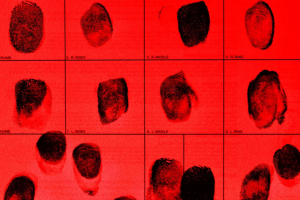
Privacy Center quoted in MSNBC op-ed about ICE and civil liberties
Executive Director Emily Tucker was quoted in Julio Ricardo Varela's op-ed in MSNBC: "The deep roots of ICE's disdain for civil liberties." The quote is from an article in WIRED from 2023 in which Tucker says: "Calling ICE a rogue agency doesn’t even quite get at how bad the problem is with them. They are always pushing to the limits of what they are allowed to do and fudging around the edges without oversight."
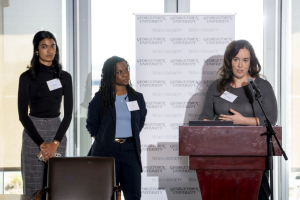
Privacy Center Fritz Fellow presented at Tech & Society Week
Postdoctoral Fritz Fellow Marianna Poyares and Fritz team members Ankita Sharma (B.S. Computer Science) and Dorea Marshall (J.D. Law) presented their research to the Georgetown community during Tech and Society week. Their research was on the ethical and legal implications of immigrant surveillance.

“American Dragnet” report cited in the San Francisco Chronicle
Privacy Center Executive Director Emily Tucker spoke with San Francisco Chronicle's Ko Lyn Cheang about a Richmond, CA municipal debit card program for undocumented immigrants that might have created an avenue for federal immigration enforcement to target them. While Tucker was not quoted, the article cited the Privacy Center's report American Dragnet: "A 2021 report, the result of a two-year investigation by Georgetown Law’s Center on Privacy and Technology, found that Immigration and Customs Enforcement, or ICE, had a $21 million contract with a data broker to access more than 400 million names, addresses and utility records."

Privacy Center Fritz Fellow presented at 2025 STS Hub “Diffracting the Critical”
Dr. Marianna Poyares was one of the panelists of the 2025 STS Hub, taking place at the Humboldt Universität in Berlin March 11 - 14. Her presentation "The border at the center: why a critical STS must grapple with border enforcement" argues that new technologies of border and immigration enforcement consist of some of the most extreme forms of surveillance and data extraction, disregarding individual and human rights protections, as they operate within the normative equivalent of a state of exception.
